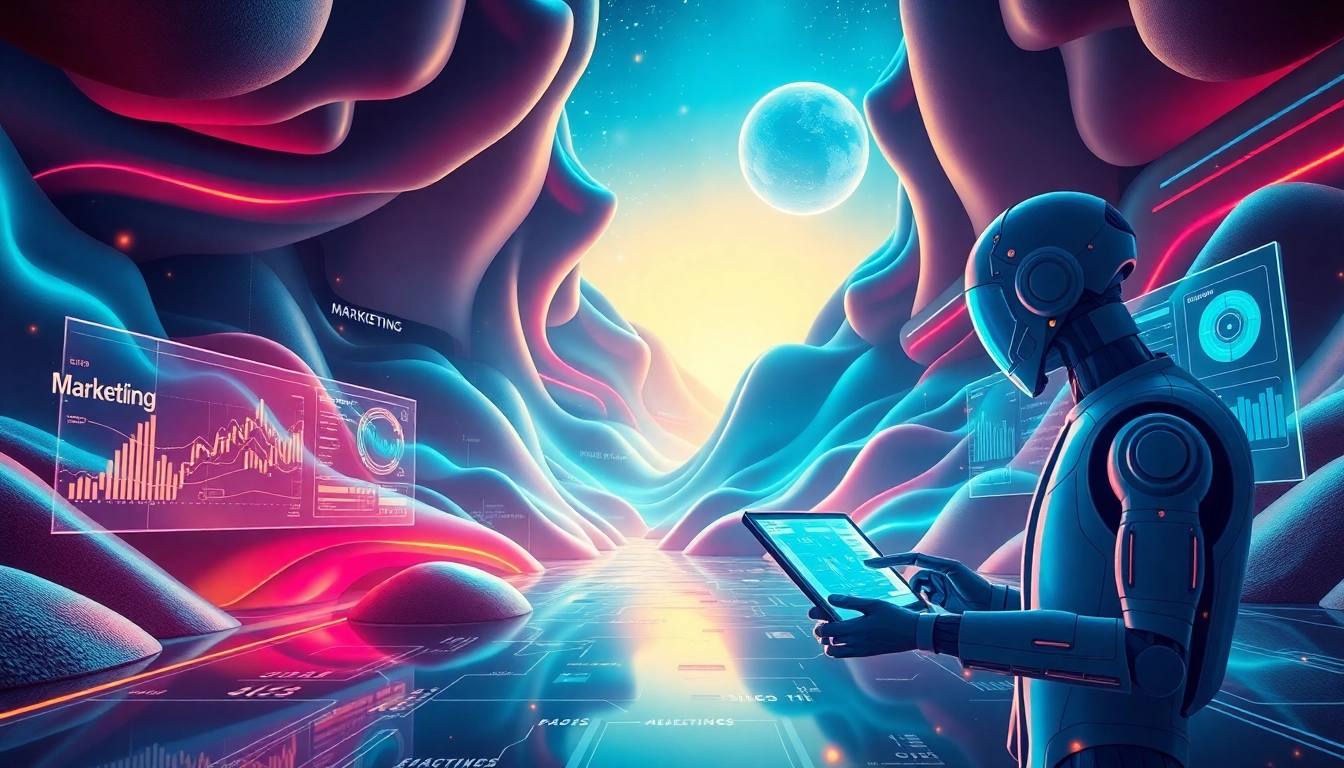Understanding AI Marketing Agents
Definition and Functionality
In an era where marketing strategies are continuously evolving, AI marketing agents have emerged as pivotal tools for enhancing business efficiency. These agents are software applications that leverage artificial intelligence (AI) to automate marketing tasks. Their capabilities include data analytics, consumer behavior prediction, and content generation. AI marketing agents can function autonomously, executing marketing strategies based on algorithms that analyze vast amounts of data, while still requiring a level of human oversight to ensure strategies align with broader business objectives.
Key Features of AI Marketing Agents
At the core of AI marketing agents are several key features that set them apart from traditional marketing tools:
- Automation: AI marketing agents automate repetitive tasks such as email marketing, social media posting, and customer segmentation, allowing marketers to focus on strategic initiatives.
- Data Analysis: They analyze consumer data to identify trends and insights, enabling more informed decision-making and strategy formulation.
- Personalization: By utilizing consumer data, AI marketing agents can deliver personalized content and recommendations, enhancing user engagement.
- Predictive Analytics: These agents can predict future consumer behaviors based on historical data, helping businesses to tailor their offerings more effectively.
- Performance Tracking: AI marketing agents monitor and report on campaign performance, allowing for real-time adjustments to improve outcomes.
Distinction from Traditional Marketing Tools
Unlike traditional marketing tools which may rely heavily on manual input and static data analysis, AI marketing agents utilize dynamic algorithms that learn and adapt over time. Traditional tools often provide insights based solely on historical data, while AI agents are capable of forecasting future trends and consumer behaviors with greater accuracy. This capability allows businesses to pivot quickly in response to changing market conditions and consumer preferences.
Benefits of Using AI Marketing Agents
Enhanced Efficiency and Automation
One of the most significant benefits of AI marketing agents is their ability to enhance operational efficiency. Through automation, businesses can eliminate redundancies and streamline workflows. For instance, tasks like email campaigns can be scheduled, and customer interactions can be personalized automatically based on user behavior. This not only saves time but allows marketers to retain focus on strategic planning and creativity, driving innovation within their marketing teams.
Improved Customer Insights and Engagement
AI marketing agents excel at gathering and interpreting data, which leads to improved insights into customer preferences and behaviors. By analyzing customer interactions across multiple touchpoints, these agents can decipher complex data sets and uncover patterns that would be impossible for humans to process efficiently. This deeper understanding enables businesses to tailor their marketing efforts more precisely, resulting in enhanced customer engagement and loyalty.
Personalization at Scale
In a world where consumers increasingly expect personalized experiences, AI marketing agents deliver tailored content at scale. Utilizing algorithms that analyze user data in real-time, AI can adjust marketing messages, offers, and content to fit individual preferences and behavior patterns. This level of personalization not only boosts engagement but also significantly increases conversion rates, as targeted messaging resonates more with audiences.
Implementing AI Marketing Agents in Your Business
Choosing the Right AI Agent for Your Needs
When selecting an AI marketing agent, businesses must consider factors such as their specific marketing goals, the nature of their industry, and their target audience. Comprehensive evaluations of available solutions can involve trial periods, consultations with vendors, and assessments of case studies that demonstrate tangible results. It is imperative to choose an agent that aligns well with existing tools and integrates seamlessly into the current marketing strategy to maximize efficacy.
Integration with Existing Marketing Tools
Successfully implementing AI marketing agents requires careful integration with existing marketing technologies. This often involves aligning the AI tools with customer relationship management (CRM) systems, marketing automation platforms, and data analytics tools. Ensuring compatibility and interoperability can provide a unified platform that enhances data flow and insight generation while minimizing disruptions to ongoing operations.
Monitoring and Evaluating Performance
Post-implementation, monitoring the performance of AI marketing agents is crucial for continuous improvement. Establishing key performance indicators (KPIs) tailored to specific campaigns—such as click-through rates, conversion rates, and customer feedback—will enable businesses to evaluate the effectiveness of their AI marketing strategies. Regular analysis of these metrics can drive refinements to enhance user experience and campaign success.
Challenges in AI Marketing Agent Adoption
Data Privacy and Management Concerns
With the deployment of AI marketing agents comes the significant challenge of data privacy management. As these agents process large amounts of consumer data to inform decisions, businesses must prioritize compliance with data protection regulations like the General Data Protection Regulation (GDPR) and the California Consumer Privacy Act (CCPA). Implementing robust data governance frameworks and ensuring transparency with customers about data usage can help mitigate privacy concerns.
Overcoming Technical Barriers
Many organizations face technical barriers when implementing AI marketing agents, including a lack of understanding of AI technologies and insufficient IT infrastructure. Training staff on how to leverage these agents effectively, and collaborating with IT departments to ensure technological readiness, can significantly ease these transitions. Organizations may also consider partnering with AI consultants who can provide expertise throughout the deployment process.
Maintaining Human Oversight in Automation
While AI marketing agents automate many processes, the need for human oversight cannot be overstated. Human intuition and creativity remain invaluable in crafting compelling marketing messages and making strategic decisions. Establishing clear protocols that define the roles of both AI and human marketers can create a symbiotic relationship where AI handles data-intensive tasks, while humans guide the creative aspects of marketing campaigns.
The Future of AI Marketing Agents
Trends Shaping the Market
The landscape for AI marketing agents is continuously reshaping with emerging trends such as increased integration of machine learning, holistic marketing strategies, and voice-activated technology usage among consumers. Furthermore, the rise of social commerce and hyper-personalization demands that AI marketing agents evolve to meet greater expectations for immediacy and relevance.
Emerging Technologies and Innovations
The ongoing development of technologies such as natural language processing (NLP), computer vision, and sentiment analysis is playing a transformative role in how AI marketing agents function. These innovations enable agents to conduct more nuanced analyses of consumer sentiment and behavior, facilitating even deeper personalization and engagement strategies. As AI technologies advance, businesses that leverage these improvements will likely see significant competitive advantages.
Predictions for 2025 and Beyond
Looking ahead, predictions suggest that AI marketing agents will not only become more sophisticated, but also more prevalent throughout various sectors. With spending on AI technologies projected to reach $107.5 billion by 2028, businesses that adopt these advancements early will position themselves as leaders in innovative marketing. Furthermore, as AI continues to evolve, enhanced predictive capabilities combined with enriched data sources will enable unprecedented levels of personalization, elevating consumer experiences to new heights.



